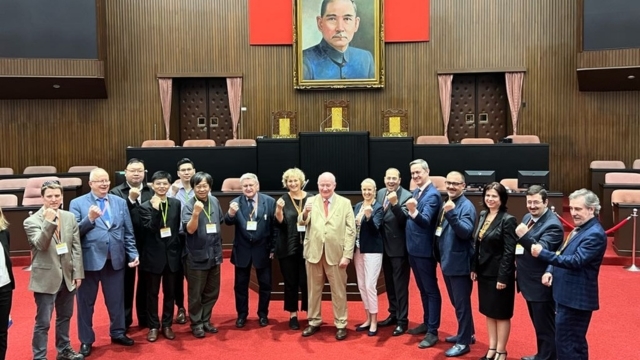Celebrating the International Day of Multilateralism and Diplomacy, scholars and witnesses from three different continents discussed how the long-lasting case may be finally solved.
by Daniela Bovolenta

On April 24, 2023, U.N. International Day of Multilateralism and Diplomacy, CESNUR and the Brussels-based NGO Human Rights Without Frontiers (HRWF) organized one of their bi-monthly webinars on the Tai Ji Men case. Under the title “International Cooperation for Freedom of Religion or Belief and the Tai Ji Men Case,” international scholars and human rights activists discussed in particular the theme of citizen diplomacy, or “diplomacy from below” carried out by NGOs, scholars, and human rights experts, as opposite to the “diplomacy from above” of the states. The webinar followed the trip to Taiwan of a delegation of scholars and human rights experts put together by Bitter Winter, CESNUR, and HRWF, who participated in academic conferences but also practiced citizen diplomacy, by meeting with Taiwanese authorities and discussing with them issues of freedom of religion or belief, including the Tai Ji Men case.
The full video of the webinar.
Willy Fautré, co-founder and director of HRWF, introduced the webinar by reflecting on the word “multilateralism,” which is also part of the designation of the April 24 U.N. day of observance. “Multilateralism,” Fautré noted, in United Nations language refers to the peaceful cooperation between different nations and international organizations to achieve specific results. If the result to be obtained is the solution of the Tai Ji Men case, Fautré observed, a “multilateral” approach requires the involvement of the United States, Taiwan’s main ally, and other democratic countries that are friends of Taiwan. The scholars who visited Taiwan achieved important results, Fautré said. But for a truly “multilateral” approach they should also take the Tai Ji Men case to the United States, the European Parliament, and other countries and venues that can have an influence on Taiwan’s government.

Fautré also presented a video on the recent 2023 conference on religion at the Australian National University in Canberra, where Tai Ji Men dizi (disciples) Chen Yi-Shuan and Rebecca Wang presented papers, and Massimo Introvigne, editor-in-chief of Bitter Winter, and deputy editor Rosita Šorytė also discussed Tai Ji Men’s activities and legal and tax problems.
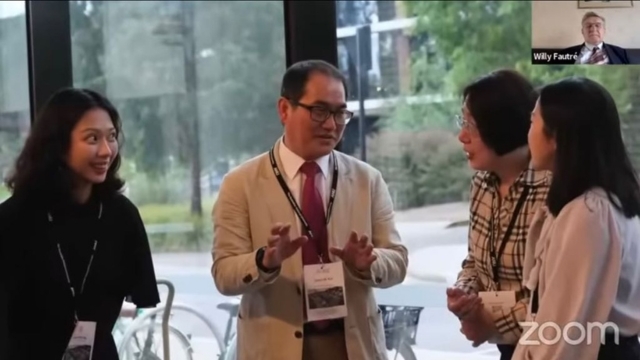
Fautré then introduced the first two speakers, Argentinian anthropologist Maria Vardé and Marco Respinti, an Italian scholar and journalist who serves as director-in-charge of Bitter Winter. Vardé examined the Tai Ji Men case as a paradigmatic example of organized discrimination against a spiritual minority labeled as a “cult,” with some local authorities ordering a raid, slandering the defendants through the media, keeping a spiritual leader in detention in inhumane conditions, throwing in ridiculous accusations of “black magic,” and following up with false accusations of financial crimes or tax evasion. She found in these features of the Tai Ji Men case a very precise parallel with prosecutions instigated by the anti-cult movement and by publicity-seeking prosecutors in Argentina, including the two cases against the Buenos Aires Yoga School that Bitter Winter has recently discussed.
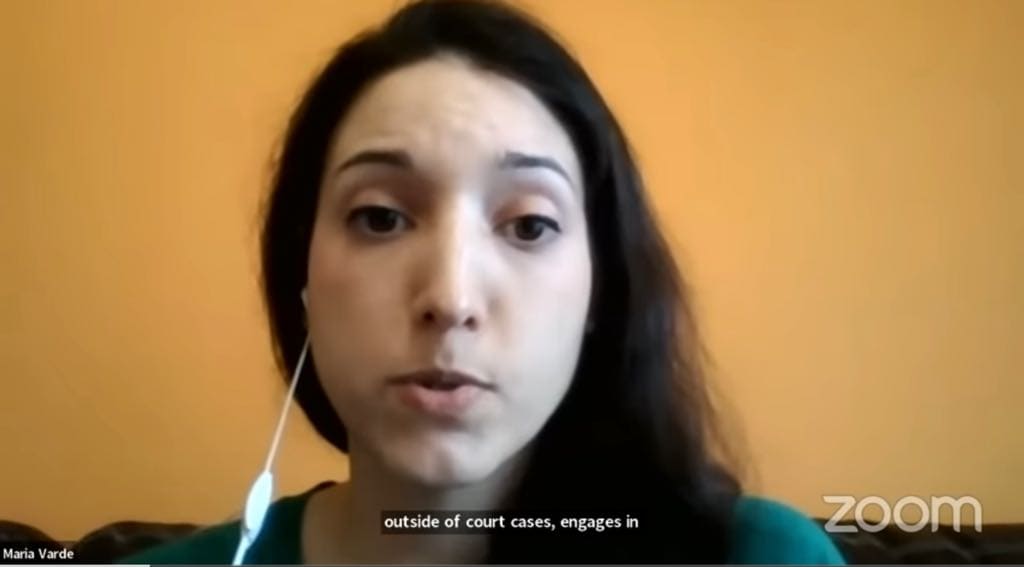
Respinti returned to the scholars’ recent visit to Taiwan, insisting on their meetings with the Presidents of the Legislative Yuan, Taiwan’s Parliament, and the Control Yuan, the unique Taiwanese “fourth power” in addition to the legislative, executive, and judiciary, in charge of controlling the other three. Respinti reported that he was particularly impressed by a comment by the President of the Control Yuan, Chen Chu, mentioning a “middle way” where the solution of the Tai Ji Men case can be found. The expression “middle way,” Respinti said, has profound philosophical implications both in Eastern and Western culture. It does not indicate a compromise, but an effort at reaching wisdom and justice, precisely what would be needed in the Tai Ji Men case.
The second session was chaired by Alessandro Amicarelli, a London-based human rights lawyer and the President of the European Federation for Freedom of Belief (FOB). He noted that the presence of so many young dizi as witnesses in the webinars proves that Tai Ji Men will never give up, as each generation is followed by the next one in the fight for justice and human rights. Amicarelli presented a video featuring the visit of the scholars’ delegation to Taipei’s National Human Rights Museum, where they learned details about the tragic years of the White Terror, before Taiwan abrogated the Martial Law in 1987. He then introduced the testimonies of five dizi.

Jason Tang, a second-year graduate student, reflected on the key Tai Ji Men teaching of the primacy of conscience, and told two significant stories. The first was about his university mentor, an expert in the reconstruction of car accidents. He saw him testifying as an expert witness in court in the case of a student killed by a truck. The professor determined that the truck driver was not guilty, and the accident had happened because of the student’s fault. Rather than being angry at the expert witness, the student’s parents thanked him for having told them the truth about their son’s death. They followed their conscience rather than their anger, just as Jason and other dizi made their conscience prevail over their fears in confirming their trip to Turkey in March 2023, even after they had learned that a terrible earthquake had hit the country. Tang expressed the hope that conscience can also prevail among those Taiwan’s government officers that have the power to solve the Tai Ji Men case.
Linda Chang, a university student, returned to the concept of “multilateralism,” noting that it originally seemed to her difficult to understand. However, she found a clear explanation of it in the words of Tai Ji Men’s Shifu (Grand Master), Dr. Hong Tao-Tze, who explained that multilateralism means treating all countries of the world freely and with respect, so that global security and stability may be maintained. Chang observed that Dr. Hong and Tai Ji Men practice multilateralism themselves, visiting all countries who would welcome them and their message of peace and love, and treating everybody with respect. This is possible, Chang commented, only because Tai Ji Men Shifu and dizi keep multilateralism firmly rooted in conscience. Taiwan’s authorities have acknowledged Tai Ji Men’s important international role, Chang concluded, which makes all more paradoxical the fact that at the same time they have been unable to stop Tai Ji Men’s harassment and tax persecution.
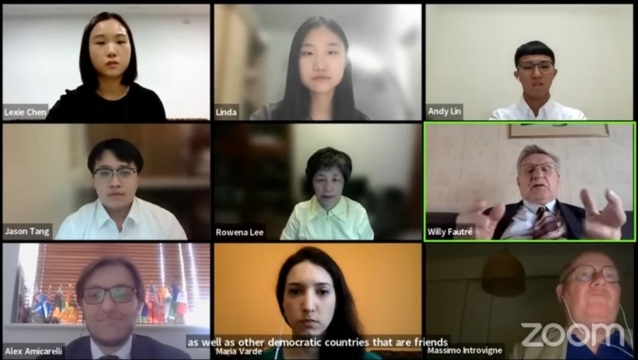
Andy Lin, a college student studying civil engineering, explained the benefits he received from his practice of qigong with Tai Ji Men. He then reported the case of one of his relatives, engaged in the construction industry. Based on objections to a contract with an engineering company, his relative was persecuted for years by the tax authorities and in the end had to pay taxes for the same business twice. According to Lin, this is a good example of the “tax disasters” that limit the progress of Taiwan’s economy and cause human rights violations, of which the Tai Ji Men case is the most egregious example.
Lexie Chen, a junior university student, described her relation as a Tai Ji Men dizi to her Shifu, whose main teaching is to follow conscience. Dr. Hong is certainly a beloved leader, she said; on the other hand, he teaches that “everyone is the leader of his or her own conscience.” Chen saw these teachings at work when she accompanied Dr. Hong to the 23rd Conference of Chief Justices of the World held in Lucknow, India, in November 2022. She also saw the denial of the values of conscience in the systemically dysfunctional tax system in Taiwan, of which the Tai Ji Men case is just one among several examples.
Rowena Lee, a retired teacher, started her testimony with some thoughts on the war in Ukraine, his terrible death toll, and the international plans for monetary compensations to countries helping Ukraine and Ukrainian refugees. The money could have been put to better use if the war had not taken place, Lee said. As a Tai Ji Men dizi, she learned from her Shifu that peace can be achieved only by turning to conscience and acknowledging its key role. Several world authorities, Lee added, have honored Dr. Hong for this insight and his efforts on behalf of peace and conscience, through several awards. It often happens, however, Lee noted, that those who benefit humanity are persecuted in their own countries, and this was the fate of Dr. Hong and Tai Ji Men in Taiwan. She expressed the hope that what she called the “absurd” Tai Ji Men case may soon be solved, and a fairer tax system may be implemented in Taiwan, thus attracting more foreign investments and boosting the economy.

Massimo Introvigne presented the conclusions of the webinar, held on a U.N. Day celebrating diplomacy. He focused on the figure of Italian Renaissance diplomat Nicolò Machiavelli, one of the greatest theorists of diplomacy in human history, and at the same time so much an astute and cunning man that in England his first name was given to the Devil, who was called “Old Nick.” Machiavelli surely presented a diplomacy without conscience, Introvigne said, but it is unclear whether he did it to promote or, on the contrary, to denounce immoral diplomats and rulers. Interpreters of Machiavelli agree that a diplomacy without conscience may give some immediate results but normally fails in the long run. This is relevant for Tai Ji Men, Introvigne concluded, both because Dr. Hong’s teachings about the primacy of conscience are also important for diplomacy and because a conscience-based “citizen diplomacy” by scholars and activists may now play a key role for solving the long-lasting case.
The event was closed by a video about Tai Ji Men’s dragon dance and its preparation through the construction of the dragons, which respects millennia-old rules and is at the same time a spiritual experience and an act of love.
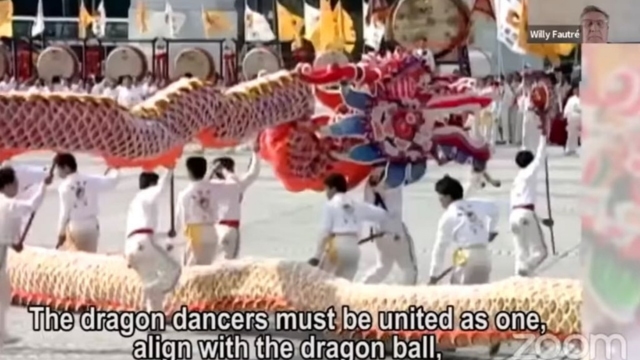
Source: Bitter Winter

